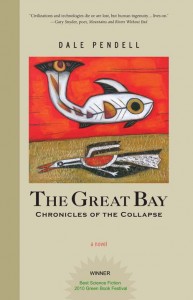Dale Pendell: The Great Bay: Chronicles of the Collapse
August 21, 2010 by David
Filed under Fiction, WritersCast
 978-1556438950 – North Atlantic Books – Hardcover – $21.95
978-1556438950 – North Atlantic Books – Hardcover – $21.95
This is an amazing novel. Consider it a work of “ecological science fiction” as some have called it. I found it captivating, terrifying, incredibly emotive and reading it becomes almost a spiritual exercise. Pendell posits a worldwide collapse of population from a biological war gone amok. More than 95% of humanity disappears, almost overnight. He actually does not spend much time on this part of the story, horrific as it is, because that catastrophe is really just the lead in for the much bigger story of what happens next.
Aside from the critical principle of understanding, that modern human society will simply collapse, that going back to prior technologies becomes impossible because people no longer have the knowledge or skills, to live the way our ancestors did, and critically, cannot relearn them overnight in the face of societal collapse, the central tenet of this novel is that climate change will have been unleashed by what modern society *has already done* to the natural world. The computer models of planetary climate change are simply not able to fully contain and predict the massiveness of what is about to happen to the planet and the natural world that inhabits it.
The novel is essentially a brilliant imagining of what might or could be the future of the planet over the next hundreds, thousands of years, based on the supposition that humans have already begun this process of change. It’s a rich set of interlocking stories, mostly focused on the area that is known today as California, a bio-geographic landscape that author Pendell knows well, and imagines changing in profound and sometimes painful ways for the reader of his story.
This is a very unusual novel – really the main character is the planet and there are no traditional heroic human characters at its center. While we might search for and find labels for it (“dystopian” or “utopian,” “science fiction” or even “parable”), I’d rather think of it as a kind of vision-telling, a myth in the making, that seeks to change the way we think about ourselves. Indeed, there is a great deal of suffering and difficulty in the book, and at the same time, a powerful sense of continuity, what truly sustains. As the great poet Gary Snyder (who is a fictionalized character in the book, as it happens), says about the novel: “Civilizations and technologies die or are lost, but human ingenuity–families, tribes, and villages, the musicians, shamans, philosophers, and people of power–live on.” I’d add that not only does human ingenuity live on, so does Gaia, our planet home, adjusting and re-adjusting its inner and outer being, regardless of which or how many humans may be hanging on for dear life.
In my conversation with Dale, we talked about his background as a writer, poet, biologist, and how this brilliant vision of a book came into being. It’s an interview and a book I’d recommend to all my friends and colleagues – it’s impossible to read and not do alot of thinking about the future, as well as what we need to do about it – right now.
Podcast: Play in new window | Download
